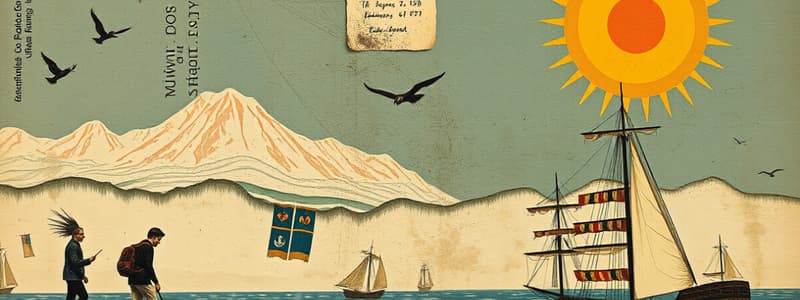Podcast
Questions and Answers
The American Indians arrived in North America between 10,000 and 15,000 years ago.
The American Indians arrived in North America between 10,000 and 15,000 years ago.
True (A)
Christopher Columbus discovered America on his first voyage in 1492.
Christopher Columbus discovered America on his first voyage in 1492.
False (B)
Marco Polo spent 17 years exploring the Americas.
Marco Polo spent 17 years exploring the Americas.
False (B)
Spain controlled much of Latin America for approximately 300 years after Columbus's voyages.
Spain controlled much of Latin America for approximately 300 years after Columbus's voyages.
The Middle Passage referred to the journey of enslaved Africans across the Atlantic Ocean.
The Middle Passage referred to the journey of enslaved Africans across the Atlantic Ocean.
The Native Americans were not affected by any European diseases brought by the Spanish.
The Native Americans were not affected by any European diseases brought by the Spanish.
The Aztec and Incan empires flourished under Spanish rule without any damage.
The Aztec and Incan empires flourished under Spanish rule without any damage.
The British established a colony in Jamestown, Virginia in 1607.
The British established a colony in Jamestown, Virginia in 1607.
Pocahontas was the daughter of a Powhatan Indian chief and helped save the English colony.
Pocahontas was the daughter of a Powhatan Indian chief and helped save the English colony.
Slavery was the only form of labor used in the English colonies.
Slavery was the only form of labor used in the English colonies.
The New England Colonies were primarily focused on farming due to their warm climate.
The New England Colonies were primarily focused on farming due to their warm climate.
Indentured servants in the colonies typically worked for 3 to 6 years to pay off a debt.
Indentured servants in the colonies typically worked for 3 to 6 years to pay off a debt.
The Southern Colonies were notable for their rivers and wetlands that supported various crops.
The Southern Colonies were notable for their rivers and wetlands that supported various crops.
Mercantilism involved gaining wealth by importing more goods than exporting.
Mercantilism involved gaining wealth by importing more goods than exporting.
Most farmers in early America practiced subsistence farming, growing just enough to feed their families.
Most farmers in early America practiced subsistence farming, growing just enough to feed their families.
Children in colonial America had a high survival rate into adulthood.
Children in colonial America had a high survival rate into adulthood.
Flashcards are hidden until you start studying
Study Notes
Arrival of American Indians
- American Indians migrated from Asia to Alaska via the Bering Strait, arriving 10,000-15,000 years ago.
- Adapted to diverse environments, using resources sustainably without waste.
- Estimated population varied from 2.1 million to 18 million, comprising over 500 different tribes.
European Exploration
- Europeans arrived approximately 500 years ago, initiating significant cultural exchanges.
- Marco Polo traveled Asia from Venice for trade, inspiring explorers like Christopher Columbus.
- Columbus made four voyages starting in 1492 but did not discover, instead encountered already inhabited lands.
Spanish Conquest
- Columbus's expeditions were marked by violence; he enslaved over 1,000 Native Americans and caused extensive suffering.
- Spain emerged as a dominant power from the 1500s to 1600s, controlling much of Latin America for 300 years.
- Spanish conquest led to the destruction of the Aztec and Incan empires and severe cultural disruption.
- European diseases introduced by Spaniards, such as smallpox and influenza, decimated Native communities.
Other European Powers
- France, England, and the Dutch also pursued exploration and colonization.
- The transatlantic slave trade emerged, lasting for 300 years, with horrific conditions on slave ships—15% mortality rate during the Middle Passage.
Colonization and Settlement
- In 1607, the British established Jamestown, Virginia; faced challenges of hunger and disease.
- Assistance from Powhatan Indians and chief's daughter Pocahontas helped the colony thrive.
- Tobacco cultivation became economically vital for survival and wealth in Virginia.
Labor Systems
- Indentured servitude allowed individuals to work off debts through labor for 3 to 6 years, with some immigrants paying their passage this way.
- Andrew Johnson, a U.S. president, was once an indentured servant.
Immigration and Mercantilism
- Immigrants sought better lives in America, fleeing persecution and seeking opportunities for safety and freedom.
- Colonies practiced mercantilism, aiming to gain wealth through trade control and colonization.
Regional Characteristics of Colonies
- New England Colonies (Massachusetts, Rhode Island, Connecticut, New Hampshire): Wealth from lumber, fishing, shipbuilding, and trade due to harsh climate.
- Middle Colonies (New York, Pennsylvania, New Jersey, Delaware): Fertile land for crop and livestock raising, known for religious tolerance and diverse immigrant settlements.
- Southern Colonies (Maryland, Virginia, Carolinas, Georgia): Favorable climate for cash crops like tobacco and rice, relied on plantations for labor from slaves and indentured servants.
Daily Life and Economy
- Farming dominated; 95% of Americans lived on farms, with a mix of cash crops and subsistence farming.
- Families often lived in single rooms, utilizing fireplaces for cooking and heating.
- Daily chores included wood chopping, animal care, and land clearing.
- Cities were bustling but often noisy and unsanitary, with high child mortality rates; many children faced hardships in their early years.
Studying That Suits You
Use AI to generate personalized quizzes and flashcards to suit your learning preferences.



